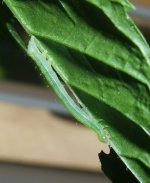LVSteve
Member
My neighborhood has a bit of a reputation for scorpions. Through destroying the habitat for them and their prey and some diligent nighttime hunting, we've managed to cull them to a manageable level. By that I mean that only one in four hunts after dark results in any kills. This is an improvement on the days when I went out 3-4 nights a week and could guarantee three at least every time.
Seems we are reaping the harvest of our efforts. This year we have seen four big cockroaches in the yard or garage. They were all dead or dying thanks to Ortho Home Defence. That's about how many we have seen in the previous three years total. Today, my wife asked me to check out her mint plants. This plant is actually inside, but was originally outside. Yep, the cabbage loopers (generic ID from the Web) found her mint, and in force. If any body knows the precise species, let me know.

Seems we are reaping the harvest of our efforts. This year we have seen four big cockroaches in the yard or garage. They were all dead or dying thanks to Ortho Home Defence. That's about how many we have seen in the previous three years total. Today, my wife asked me to check out her mint plants. This plant is actually inside, but was originally outside. Yep, the cabbage loopers (generic ID from the Web) found her mint, and in force. If any body knows the precise species, let me know.
Attachments
Last edited:


